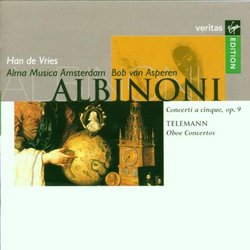| All Artists: Tomaso Albinoni, Georg Philipp Telemann, Bob Van Asperen, Alma Musica Amsterdam, Han de Vries Title: Oboe Concertos Members Wishing: 0 Total Copies: 0 Label: EMI Classics Imports Release Date: 7/11/2000 Genre: Classical Styles: Chamber Music, Forms & Genres, Concertos, Historical Periods, Baroque (c.1600-1750), Classical (c.1770-1830), Instruments, Reeds & Winds Number of Discs: 1 SwapaCD Credits: 1 UPC: 724356115224 |
Search - Tomaso Albinoni, Georg Philipp Telemann, Bob Van Asperen :: Oboe Concertos
 | Tomaso Albinoni, Georg Philipp Telemann, Bob Van Asperen Oboe Concertos Genre: Classical
|
Larger Image |
CD Details |
CD ReviewsDelightful period instrument concertos Leslie Richford | Selsingen, Lower Saxony | 08/06/2004 (5 out of 5 stars) "This delightful recording was made in two sessions, one in Haarlem in 1980, the other in Amsterdam in 1981. At the Haarlem session, four oboe concertos by Tomaso Albinoni (from Opus 9) were recorded. Albinoni was a contemporary of Vivaldi in Venice and was married to an opera singer. Perhaps that is the reason why his oboe concertos tend to sound like instrumental versions of opera arias, with long, luxurious phrasing and almost vocal interchange between the soloist and the first violins. His concertos are all in the da camera form (fast - slow - fast) and combine elegance with balance. The slow movements are delicate and languorous, and that of the D minor concerto in particular (Track 2) bears being listened to time and time again. Soloist Han de Vries plays them on a German oboe by Gottlieb Crone, built around 1735, and the sound is quite charming: The oboe (haut-boys) was originally a wooden instrument, and a comparison with the Naxos recording of some of these concertos on a modern oboe (Anthony Camden Albinoni: Oboe Concerti, Op. 9) makes the difference very plain: the modern oboe sounds higher and more metallic, the historical instrument has a deeper, warmer, wooden tone, and EMI's engineers have ensured that this is constantly the centerpoint of the listener's attention. Bob van Asperen's Alma Musica (4 first violins, 3 second violins, two violas, two cellos, a violone and a harpsichord, all either original period instruments or reconstructions) is accordingly placed a little in the background. The re-mastered analogue recording is excellent, although there is not quite so much drive and clarity as in the second half of the CD, which was recorded using digital technology.
Linking Albinoni and Telemann seems at first to be a rather abstruse idea, although they were contemporaries. But Telemann's youthful oboe works, although quite different from Albinoni's, give Han de Vries a further opportunity to let us hear the glories of his instrument and his phrasing. Of the three concertos recorded here, the F minor (the only one in the da camera style, the other two have the opening da chiesa slow movements) is the most captivating, its opening Allegro a source of sheer delight. Like most of Telemann's music, this irradiates joie de vivre coupled with total harmony and equilibrium. For the Telemann, the EMI engineers have brought the ensemble a little more into the foreground, enabling one to follow closely where Telemann intertwines his soloist with the strings. These could, perhaps, be a little richer, but that is a minor quibble. All in all, an excellent production for fans of baroque music on period instruments." |

 Track Listings (23) - Disc #1
Track Listings (23) - Disc #1